Entertainment
How the creator of 'Gilmore Girls' reinvented 'Once Upon a Mattress' for a new generation

It was a text from Sutton Foster that got Amy Sherman-Palladino to drop everything. The Tony-winning actor was leading a new production of “Once Upon a Mattress,” a musical take on “The Princess and the Pea” that in previous incarnations starred Carol Burnett and Sarah Jessica Parker. Might the creator of “Gilmore Girls,” “The Marvelous Mrs. Maisel” and Foster’s own “Bunheads” take a pass at the stage show’s script?
“For Sutton Foster, anything,” Sherman-Palladino recalls. What was supposed to be a quick punch-up gig for a two-week Encores! stint has turned out to be the scribe’s Broadway debut, as the production — about a queen who discourages her son’s wedding prospects with impossible tests, and a swamp princess who takes on the challenge — has begun a four-month run at New York’s Hudson Theatre before moving to Los Angeles’ Ahmanson Theatre in December.
The revival, directed by Lear deBessonet (“Into the Woods”), also stars Michael Urie, Ana Gasteyer, Will Chase, Brooks Ashmanskas, Daniel Breaker, Nikki Renée Daniels and David Patrick Kelly. And Sherman-Palladino, who left the stage behind to pursue her TV dreams, has joined a burgeoning club of writers updating classic musicals for new generations (Amber Ruffin and “The Wiz,” Larissa FastHorse and “Peter Pan”).
Between rehearsing “Once Upon a Mattress” and shooting her Prime Video ballet-centric series “Étoile,” the showrunner-turned-librettist got candid about rewriting a musical’s book on a tight timeline, ridding a fairy tale of its misogyny and bringing physical comediennes back to Broadway. This conversation has been edited and condensed.
You made an early career choice between writing for “Roseanne” and attending a “Cats” callback. Since then, you’ve consistently cast stage actors and snuck musical numbers into your TV shows. How does it feel to finally be working on a theater project?
It’s completely bananas. I just lucked into the fact that this wonderful person in my life named Sutton Foster texted me one sentence — that was the extent of the negotiation, I drove a hard bargain — that has changed everything, and now I’m getting to be a little part of a world I admire so much. What world am I in that my job is to sit at this table read and listen to these people harmonize around me like this?
Had you seen the musical before?
I had never seen it. I knew some of the music — “Shy,” “Happily Ever After” — and I think I’d seen a version on television. What I did know is Carol Burnett. There’s not a lot of women who have that comedy, that big voice, that command of the stage — well, except this kid named Sutton Foster who’s been running around.
Sutton and “Mattress,” that’s perfect casting. The first thing she said to me was, “I want to be so gross, I want to be as disgusting as possible, I want to be this true Swamp Thing that crawled out of the muck.” And yet you fall in love with her, even with s— in her hair and leeches on her back. Nobody finds moments of humanity in insanity like Sutton Foster, and in this she’s certainly at her most insane.
Sutton Foster, center, and the Broadway cast of “Once Upon a Mattress.”
(Joan Marcus)
When you first signed onto the rewrite, was Broadway in the conversation?
I thought this was just for City Center, where they rehearse for like two weeks and then perform for two weeks. I may have had two weeks to get them the draft — a fun couple of weeks of writing jokes and lobbying hard for one classless d— joke, come on, Lear, let me get one in! It’s amazing to watch because it’s so fast and frenetic, and the fact that they can pull it off at all and at the level at which they pull it off, it’s such a thrill. So I thought it was over, and then suddenly, it’s going to Broadway. Well, I had all this other stuff I wanted to put in it, so can I put it in now?
Sometimes, these things take years to get to Broadway, and in that time you do try things and throw out things and put things in. But the whole thing has happened unbelievably fast. I think part of the reason that everybody thought it could go to Broadway so quickly is because it felt like Michael Urie and Sutton [as Prince Dauntless and Princess Winnifred, respectively] had been rehearsing for months. From day one, they were so in the pocket of being weird together and speaking each other’s language that it was a kind of magic.
I managed to shove a few more things in there that I had really, really wanted to, but in my dream of dreams, we would have had a proper time frame to really dig deep. But for me, nothing is ever done. I look at the “Gilmore” pilot, and I’m like, can I rewrite that? I remember when they sold “Gilmore” to Netflix, I said, “Can I remix the whole thing? Because I was never really happy with the sound on it.” And they’re like, “Yeah, can you not call us again? It’s a done deal, lady, you’ve got to move on.”
How did you go about rewriting the book by Jay Thompson, Dean Fuller and Marshall Barer, especially in such limited time?
Making everybody happy was hard. Over the years, there have been several kinds of incarnations of this show: The structure was changed, some characters were left out, and there was actually not one definitive blueprint to follow. So I’m working off of production drafts and working with three different estates, and the originators aren’t around to explain, “That’s what this very shorthand stage direction meant.” And at the same time, I’m in production. I’m on set on [forthcoming TV series] “Étoile,” [where] my [assistant directors] would get a glimpse of the [“Mattress”] script and go, “Who’s Winnifred?!” No, don’t look over there, your script is over here! It was insane, keeping everything straight.
I wrote a movie version of “Gypsy” — which has never seen the light of day, but I’m still hopeful — and I remember getting on the phone with Stephen Sondheim, and after all the wonderful compliments, he goes, “I just have a few thoughts, if you want to hear them.” I’m like, “Oh my God, of course!” And he goes, “I want to hurry, because page one…” It was like 15 hours, and it was the best 15 hours of my life.
That’s what you always want to be able to do, is really rip through things. This was not the project for that. It was very, very fast, and you never get to do everything you want to do at that speed.
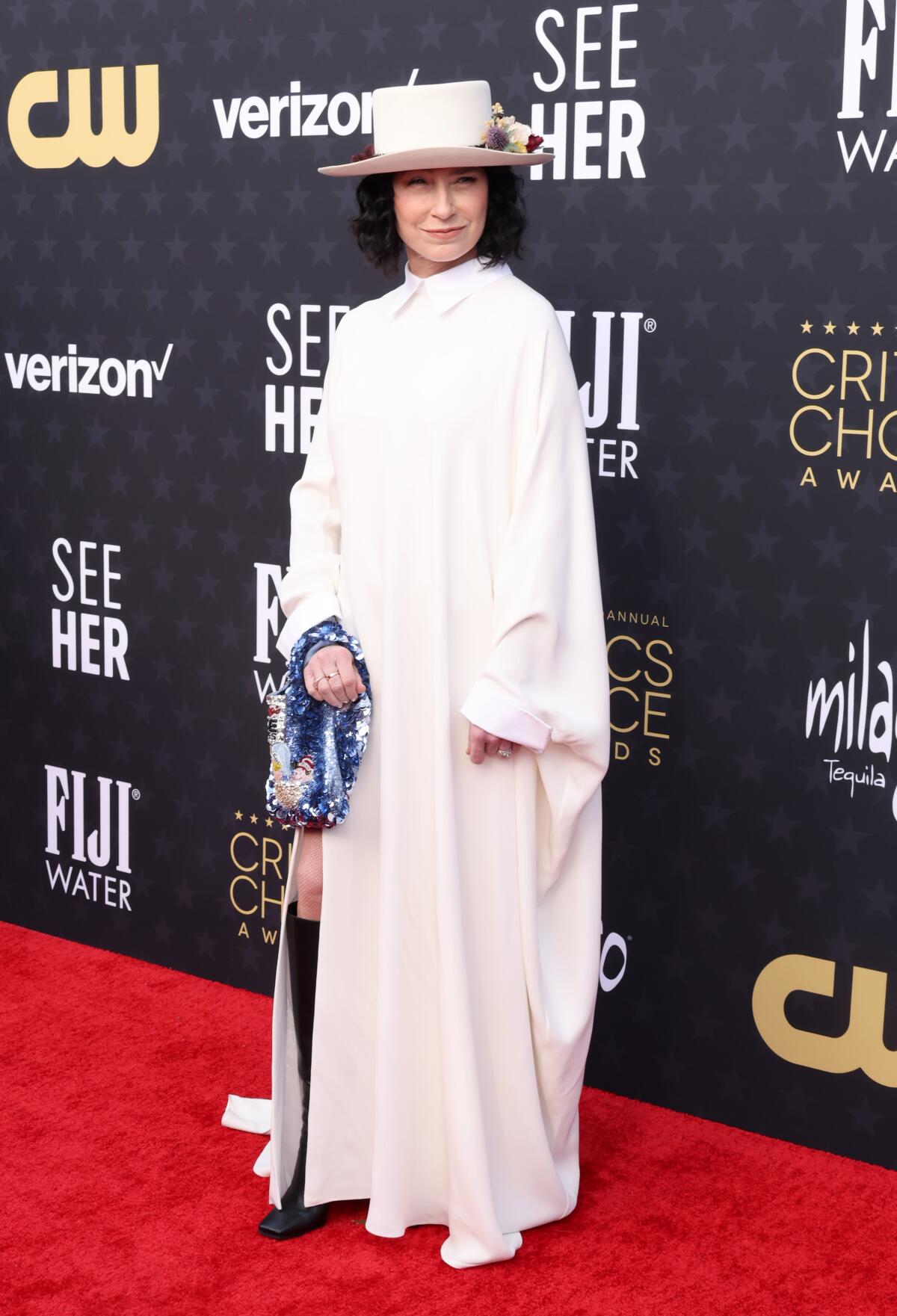
Amy Sherman-Palladino, pictured at the Critics Choice Awards earlier this year.
(Amy Sussman / WireImage)
What’s the hardest thing about updating a text tied to multiple estates?
They’re all protecting their own legacies, and you end up having to work within the confines of other people in control of your destiny. Sometimes it’s a good exercise to do that: On “Gilmore Girls,” we had zero money. “The Drew Carey Show’’ would send over their extra water and half a sheet cake if someone had a birthday over there. I mean, it takes place in Connecticut, and we’re in Burbank where there’s no snow!
Learning to craft a world and a story and seven seasons of a journey out of nothing and with nothing — that lean, mean training prepares you for anything. My job is to fight the battles that I feel are worth fighting, and to keep fighting them so that the cast feels supported by the material and Lear has what she needs to do something we’re all proud of.
I was so f— naive — I went through a draft and changed all the things I’d change in a [TV] script, and some of it was as little as changes for spacing on the page or moving the comma so the person doesn’t pause at the wrong time, not realizing that they had to redline everything for the estates. It’s one of those dumb things that was so automatic for me, but I’d just made Lear’s world 15 times harder. So I apologize, Lear, I love you, it was not on purpose.
This musical, as beloved as it is, had its share of misogynistic material. How did you approach the update for a new generation?
That was the most important thing. It is a fairy tale, which does have a lot of, “I gotta marry a prince in the end,” but that’s not the [universal] female journey anymore, which is a great thing.
We wanted to lean more into the naivete of Winnifred, somebody who has a vision in her mind of what happily ever after is. She’s got this ridiculous speech about how it means you get to do gymnastics and climb trees, but it’s the end of that monologue where she says, “You get a pal” — you have someone to share this life with. She doesn’t want someone to put her on a pedestal, to dress her up in pretty clothes and look at her like an object. She wants someone to share s— with and laugh with, someone to look at all of her weirdness that she can’t do anything about because that’s who she is, and go, “I think you are special.”
That journey of love and acceptance, of wanting to belong someplace and having someone see you for the greatness that you are, even if you did crawl out of the slime — that’s the princess journey.
This is a female-led musical driven by broad, physical comedy — a type of show Broadway hasn’t seen much lately. How do you feel it will be received by today’s ticket-buying audiences?
I think all of us are aligned in the fact that you’re not going to walk out of the show having learned any lessons. We’re not teaching you d—. You gotta learn that somewhere else. If you want to break it down and make it sound deeper than it is, it’s about being different and finding the one person who sees what’s cool about you. But it’s just a fun show. There’s nothing you’re taking away from “Oh, Mary!” either, except that, for an hour and 20 minutes, you’re going to laugh your ass off and it’s gonna leave you on a high.
Broadway is best and thrives the most when everything is represented: the dramas that make you feel hard things or change your perspective or make you cry, the shows that really make you feel s— about yourself. Sometimes, you gotta walk out of a theater feeling like absolute crap, and that’s just part of the theater experience.
But there’s also a place in theater where, for a few hours, you’ve forgotten that your kid won’t talk to you, politics are madness and the world is falling apart. It hasn’t gone anywhere, it’s all waiting for you the minute you walk back out, but you’ve had something joyous that makes it OK to wake up the next day and go into your challenging life. So why not be someplace wonderful for a couple hours?
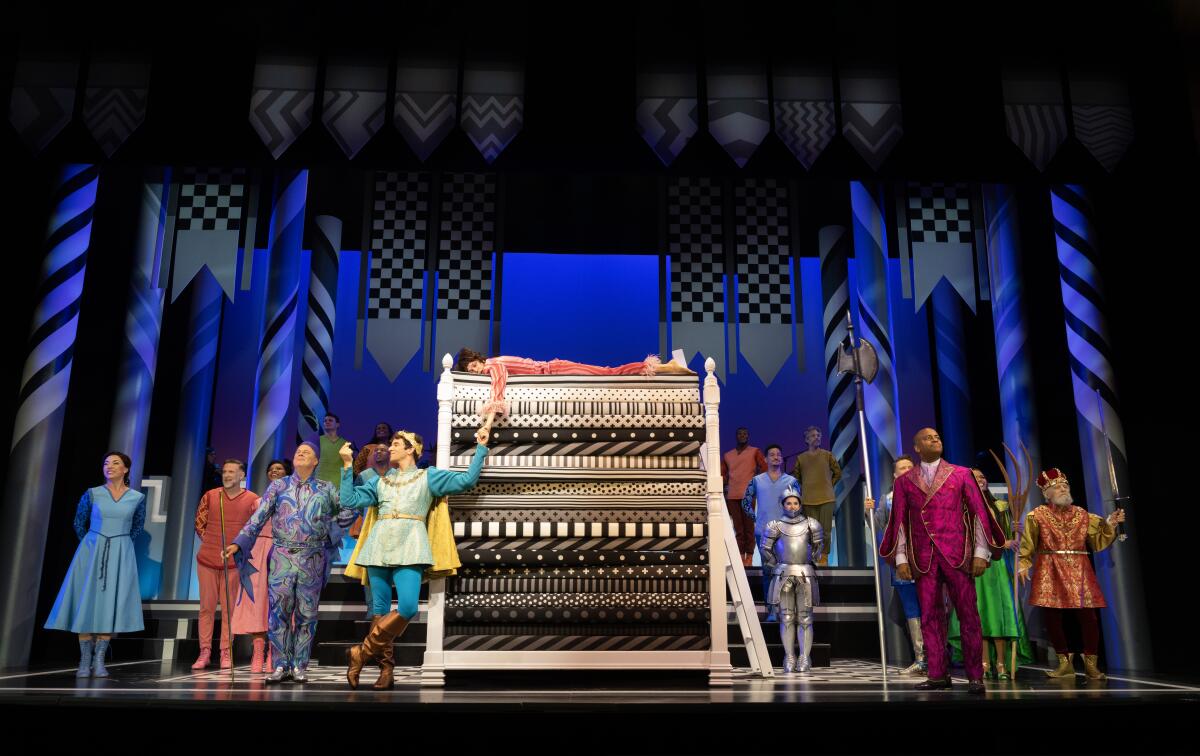
Michael Urie and Sutton Foster, center, with the Broadway cast of “Once Upon a Mattress.”
(Joan Marcus)
Are negotiations underway to have your version be the licensable “Mattress” moving forward?
There’s been discussions about it. I don’t think they wanted to take that step at this moment. Which, to me, says I gotta prove it, because if this version scores with audiences, maybe people will want to do this version. If not, then maybe people are like, “As long as she sings ‘Shy,’ I’m good.”
That’s the gig. I can’t worry about that because I have too many other things to be nauseous about. But I would love for that to happen because I love the show. And, I’d love to take another pass at it, if they’d let me, and probably another pass after that.
What was given to me by Sutton and Lear was a gift. I embrace this gift wholeheartedly and I hope I’ve done well by them. That’s all I can control at this moment. But I want to do more theater, because there’s nothing like it. It’s dangerous, anything can happen, so it’s not for the faint of heart. But I want to do more of the things that are truly and utterly terrifying, and theater is terrifying in the best way.
What advice would you give to another writer tasked with updating a classic musical?
Valium. Get a vat of Valium, up the dosage, just do it. Every time you get that call about your latest draft, just have that bottle right there. It’s gonna make everything go so much smoother.

Entertainment
In 'Squid Game' Season 3, a critique of democracy comes to the fore: 'It's like a jungle'
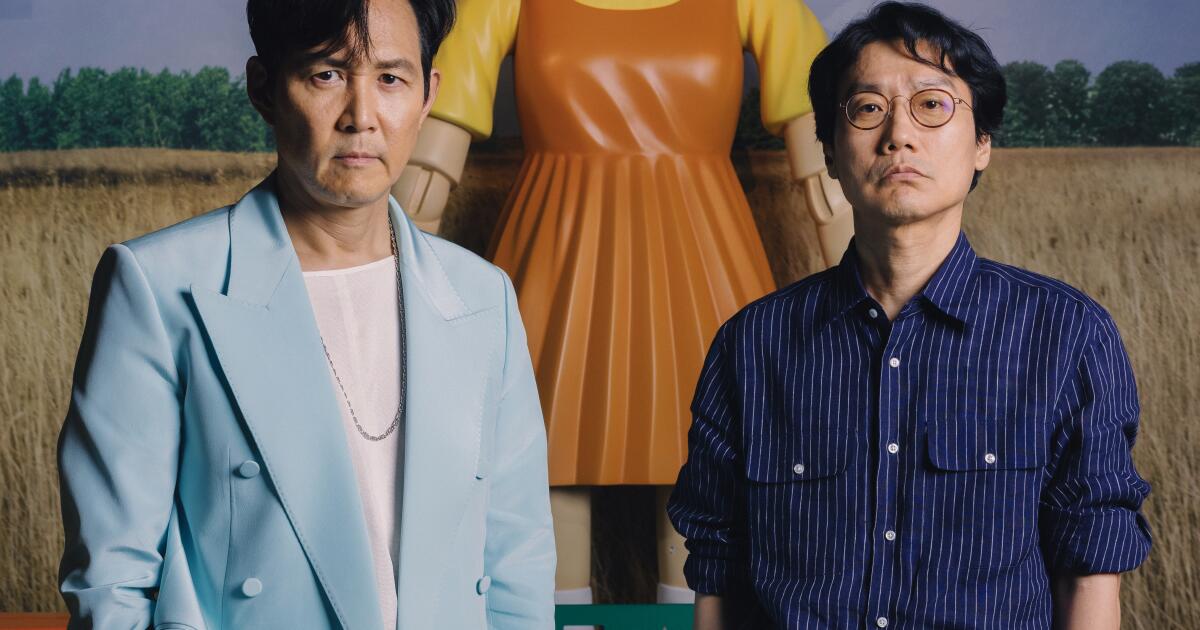
This article contains many spoilers for Season 3 of Netflix’s “Squid Game.”
“Squid Game” is a twisty, twisted thriller, with ordinary, financially stressed people playing children’s games to the death for the amusement of the hidden wealthy. Beneath that surface, creator, writer and director Hwang Dong-hyuk has been embedding sociopolitical commentary amid the shock and awe of protagonist Gi-hun’s (Lee Jung-jae) personal roller-coaster ride; the characters’ desperation as the saga ends forces those messages to poke through the slick, candy-colored exterior.
“It was a result of elevation of the themes and stories,” said Hwang of those ideas becoming more clearly voiced. They “became more upfront and intense just as a natural course of the story unfolding.”
The global phenomenon, still Netflix’s most-watched non-English show ever (its first two seasons are No. 1 and 2 on the streamer’s all-time list, with nearly 600 million views to date, according to Netflix), ends on its own terms with the release of its third and final season Friday. And what an arc everyman Gi-hun will have completed. How better to represent Hwang’s themes of end-stage, winners-and-losers capitalism, with its warping, destructive power, and how the ill-intentioned can exploit democracy’s flaws, than to depict an ordinary person buffeted by the unseen hand of pain for profit?
“You can say this is a story of those who have become losers of the game, and also those of us who are shaken to our core because of the chaotic political landscape,” said Hwang, who with Lee, spoke via an interpreter on a video call earlier this month from New York. “I wanted to focus in Season 3 on how in this world, where incessant greed is always fueled, it’s like a jungle — the strong eating the weak, where people climb higher by stepping on other people’s heads.”
Lee Jung-jae as Seong Gi-hun in final season of Netflix’s “Squid Game.”
(No Ju-han / Netflix)
Gi-hun’s hands become bloodied in the competition in Season 3, Hwang said. “That’s the first time he kills someone [in the games]. This person who symbolized goodness, the original sin is now on him because of what society has done to him,” he said. “How does he pick himself up from that? That’s the heart of Season 3. In a way, we’re all put in this situation due to the capitalist society and chaotic political situation. Gi-hun symbolizes what all of us go through these days.”
When we meet him in Season 1, Gi-hun is down and out, an inveterate gambler. Through Season 1’s horrific gantlet of murderous kids’ games, his exterior is scraped away with a rusty edge until all that’s left is a flawed but good man. Gi-hun is someone who sees what he believes with clarity, while becoming the suddenly rich champion of the games.
But after he reaches that peak, Season 2 plunges him back down the roller coaster as he becomes obsessed with vengeance against the elite voyeurs who fund the game and the Front Man (Lee Byung-hun), who oversees it. Righteous anger carries Gi-hun to the brink of his goal of destroying the games, only to see it all brutally dashed. Season 3 finds him a broken man, near catatonic with guilt. Without him to guide the less bloodthirsty players, the games will enter a fearsome phase of all-out mayhem, from which unexpectedly emerges a chance at redemption for the battered protagonist.
“All of those changes within Gi-hun are depicted in such minute detail” in Hwang’s writing, said Lee, “so nuanced and with so many layers. You’ll see Gi-hun have a change of heart. Sometimes his beliefs will be shaken. But despite all of that, he will continue to struggle to find hope and his will.
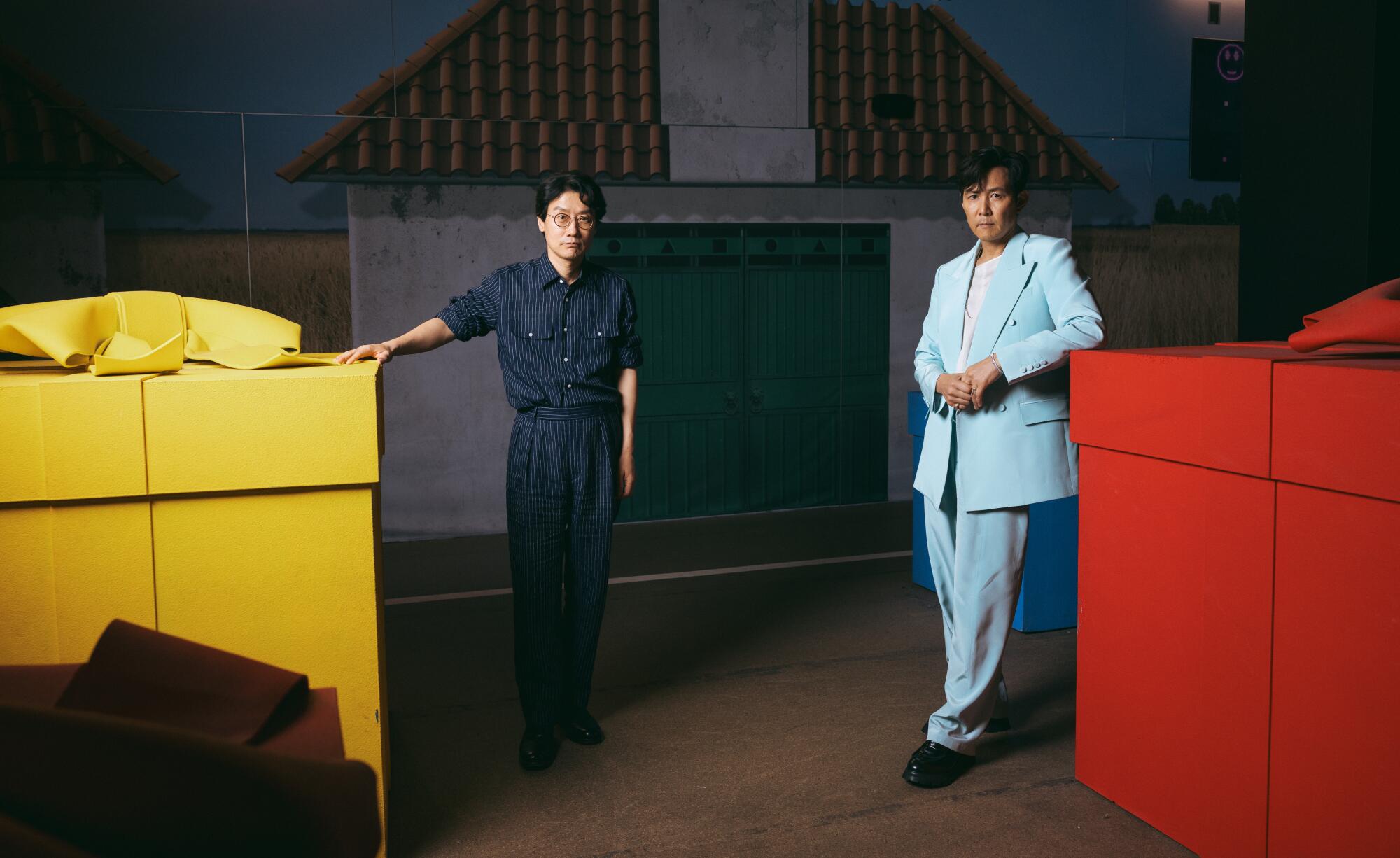
“All of those changes within Gi-hun are depicted in such minute detail, so nuanced and with so many layers,” Lee Jung-jae said of his character and Hwang Dong-hyuk’s writing.
(Justin Jun Lee / For The Times)
“All I can say is, I’m a very lucky man. You don’t come by characters like Gi-hun every day. It’s been a true honor,” he adds.
Lee’s public appearances in support of “Squid Game” have provided an almost comic contrast with Gi-hun. He’s movie-star handsome, elegant, always sharply dressed. On the show, especially as Gi-hun deteriorates in Season 3, he’s wrecked.
“Jung-jae went on this extremely harsh diet for over a year so he could really portray, externally, the pain and the brokenness, to really express how famished and barren he is, both mentally and physically,” Hwang said.
Gi-hun isn’t the only person the games destroy. Another hallmark of the show is its deft development of characters into fan favorites, coupled with its “Game of Thrones”-like willingness to unceremoniously kill them. Viewers will be sharpening their pitchforks when trans commando Hyun-ju (Park Sung-hoon), a.k.a. Player 120, dies ignominiously in Season 3. Hwang is already braced for the backlash.
“It’s not me who did it! It was 333,” he exclaimed, blaming the murderer.
Hwang said when he watched the first assembly edit of that death, “I wrote and directed and everything, I knew it’s coming, but it was still painful. It was like, ‘Oh, come on, come on.’ ”
“For some characters, I would see them go and I’d feel really sad … I would think, ‘Director Hwang is such a cruel man,’” Lee said.
1. Hyun-ju (Park Sung-hoon) in Season 3 of “Squid Game.” “I wrote and directed and everything, I knew it’s coming, but it was still painful,” Hwang Dong-hyuk said. 2. Jun-hee (Jo Yu-ri), a pregnant contestant in the games, was another casualty. (No Ju-han / Netflix)
When Hwang asks what death in particular made him feel that way, Lee doesn’t hesitate to cite another beloved character, pregnant contestant Jun-hee (Jo Yu-ri), calling that Season 3 death “heartbreaking.”
Lee’s sensitive, evolving turn as Gi-hun — deeply human amid the madness, paranoia and murder set in bright green and pink surroundings — has made the character the ideal litmus test for Hwang’s critique of an economic system designed to produce titanic winners and losers who face annihilation. He’s a living symbol of Hwang’s themes.
“I feel like Director Hwang is truly an artist,” Lee said. “I mean something akin to a concept artist. Because when he creates his visuals, not only are they extremely pleasing to the eye; he focuses on the meaning behind them. He [stacks] images on top of one another, almost as if building a Lego castle. Each little block has meaning: each dialogue, each editing flow and [each use of] the musical score.”
As Season 3 reaches a boil, some of Hwang’s symbolism becomes less subtle. In one game, contestants clutch keys suspiciously resembling crucifixes as one player leads others with fervor, for better or worse. One character’s moment of triumph occurs before a painted rainbow (rainbow flags are also associated with the LGBTQ+ community in Korea). And Hwang’s nuanced critique of democracy comes to the fore.
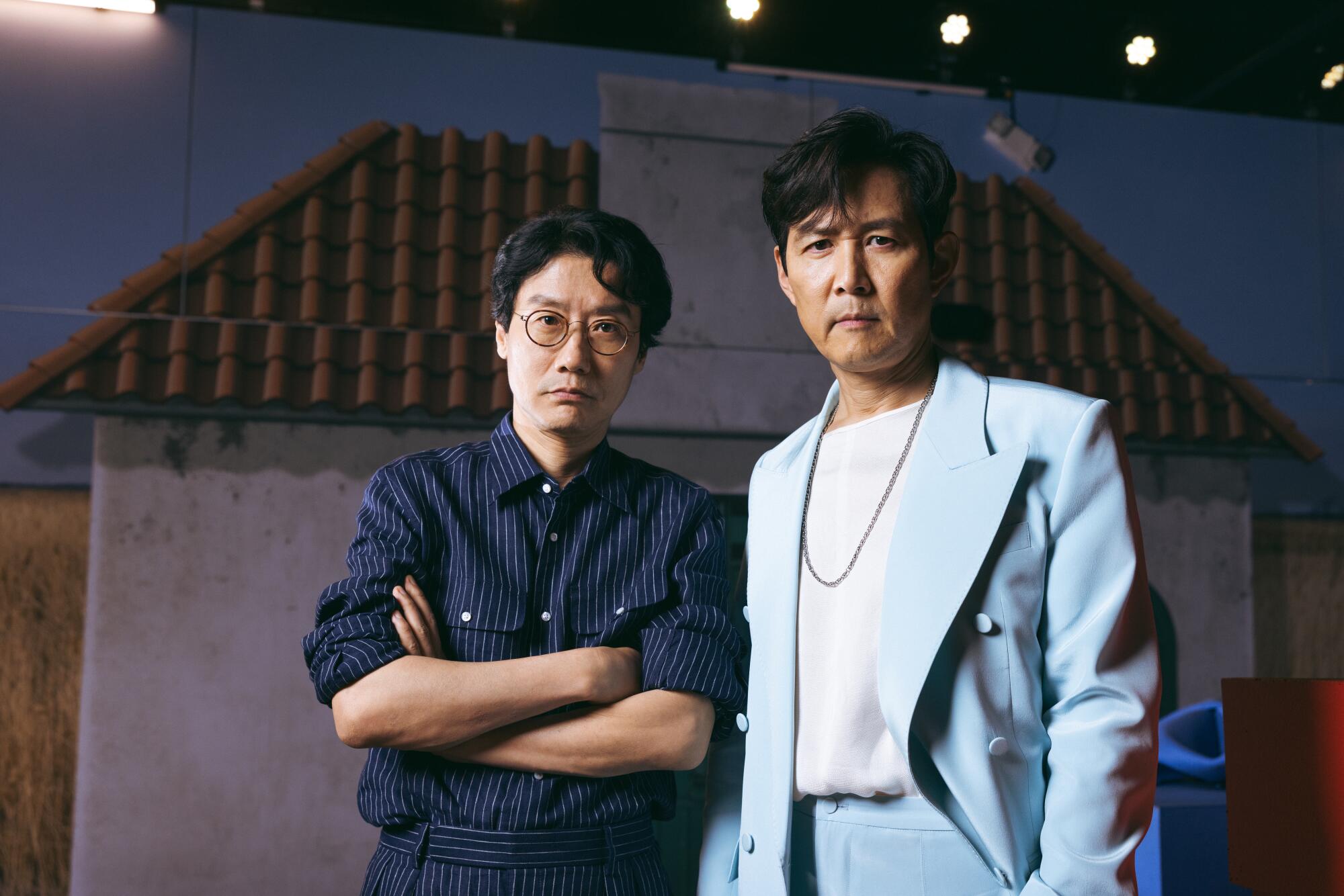
“I feel like Director Hwang is truly an artist,” said Lee Jung-jae of the show’s creator. “I mean something akin to a concept artist. Because when he creates his visuals, not only are they extremely pleasing to the eye; he focuses on the meaning behind them.
(Justin Jun Lee / For The Times)
Unlike Season 1, in which contestants had one chance to vote to end the games, in Seasons 2 and 3, votes are taken after each contest; as more players die, the pot swells larger and larger. With only a score or so of participants left, a vote to quit means all would leave alive, and with substantial cash. Voting to continue means, explicitly, they will kill to become obscenely wealthy.
“In the past, at the time of elections, despite our differences, we all came together; there was more tolerance through the process of conflict,” Hwang said. “I don’t think that is anymore the case. Rather, elections [have only driven] societies into greater divides. I wanted to explore those themes in Seasons 2 and 3; that’s why I included the voting in each round.”
Hwang loudly calls out the flaw of democracy that allows the barest of majorities to subject all to nightmarish policies — even more nightmarish for those who voted against them. The ruthless winners keep reminding the others in Season 3 it was a “free and democratic vote.”
“That is not to say that I have a different answer,” he said. “I wanted to raise the question because I believe it is time for us to try to find the answer. In Season 1, I looked at the flaws of the economic system that creates so many losers due to this unlimited competition. In Season 2, I depicted the failure of the political system.
“Coming into Season 3, because the economic system has failed us, politics have failed us, it seems like we have no hope,” Hwang added. “What hope do we have as a human race when we can no longer control our own greed? I wanted to explore that. And in particular, I wanted to [pose] that question to myself.”
And what has he found? Does he still believe in humanity?
“Well, I don’t have the answer,” Hwang said. “But I have to admit, honestly, I think I’ve become more cynical, working on ‘Squid Game.’”
Movie Reviews
‘Kannappa’ Movie Review, Star-Studded Cast’s Top Notch Performance, Second Half Stole The Spotlight

Kannappa is the dream project of Vishnu Manchu, which is set to hit the big screen on June 27, 2025. For the uninitiated, Kannappa is a Telugu language devotional film starring Vishnu Manchu in the lead role, along with a star cast that includes Mohanlal, Prabhas, and Akshay Kumar in cameo roles. The mythological epic drama centres on devotion to Lord Shiva and embodies the essence of Sanatan Dharma. As anticipation for the theatrical release of Kannappa builds, here are the early reviews of the film.
Famous screenwriter, Kona Venkat loved Vishnu Manchu’s Kannappa and shared his reviews
Taking to his X handle (formerly Twitter), popular screenwriter, Kona Venkat, praised the performances of Vishnu Manchu, Prabhas and Mohan Babu. For the unversed, along with Vishnu Manchu in the lead, Kannappa also has a supporting cast including Mohan Babu, R. Sarathkumar, Arpt Ranka, Brahmanandam, Brahmaji and many more. Kona Venkat specially mentioned the second half of the movie, which had so many wow moments. In his words:
“I too had the Privilege and the Opportunity to watch “KANNAPPA” and I am truly impressed by the content!! There are so so many WOW moments in the second half. Especially the last half hour is truly captivating and mesmerising. The presence of #Prabhas made huge impact in the movie. Every audience would definitely talk about @iVishnuManchu‘s performance in the last 20 minutes @themohanbabu garu’s performance too would be talked about for many years. I really hope that Kannappa” works big time at Box office and would help the industry during this tough times!! #HaharaMahadev #KannappaOnJune27th”

Netizens’ reaction to Vishnu Manchu starrer, Kannappa
Netizens gave mixed reaction when it came to VFX of the film, Kannappa. Praising the VFX, one user wrote, “Kanappa is a mythological entertainment package with stunning visuals and BGM. The climax is the best part of the film. Vishnu Manchu, Akshay Kumar, Mohan Babu, and Prabhas are all good. Overall the film is worth watching.” Sharing a different perspective on VFX, another user wrote, “Kannappa is visually grand with a powerful mythological core. Prabhas, Mohanlal and Akshay Kumar shine in cameos, and Rajinikanth’s praise speaks volumes. But some VFX scenes fall flat, and the pacing drags in parts.” Giving an overview of the film, one user wrote:
“#KannappaReview Vishnu Manchu delivers his career-best performance. Prabhas cameo = Goosebumps overload. Mohanlal’s character is a big surprise. BGM & elevations are top-class. Climax is pure emotion – will leave you in tears. BLOCKBUSTER LOADING 3.5/5.”
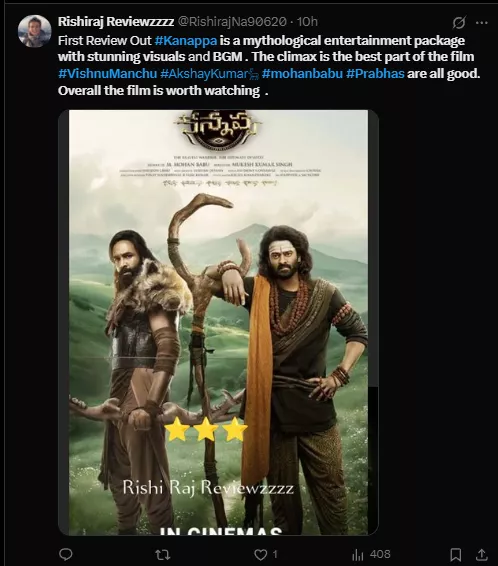

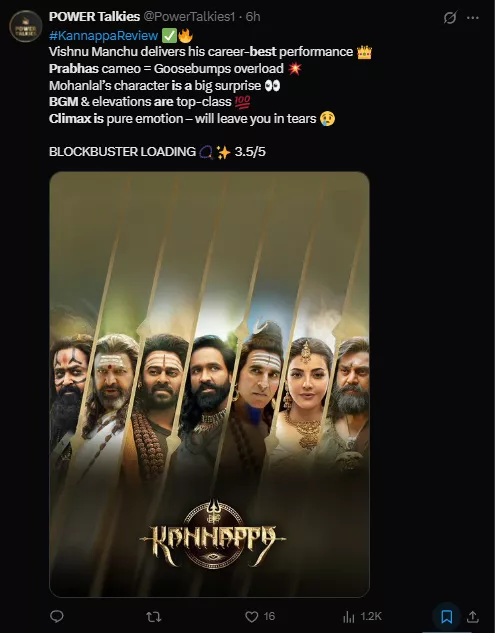
An interesting fact about Vishnu Manchu’s dream project, Kannappa
In a recent interview with SCREEN, Vishnu revealed that Mohanlal and Prabhas, who will appear in cameo roles in Kannappa, are not charging a penny. He shared how South superstar, Mohanlal, agreed to his dream project due to his love and respect for Mohan Babu, the father of Vishnu Manchu. In fact, Vishnu predicted that his Rs. 200 crore budget film might not do well at the box office, but since he wanted to make the project based on devotion towards Lord Shiva, he approached Mohanlal and Prabhas, as they had a huge fan base. Vishnu also shared how the duo refused to accept money when he offered it to them. In his words:
“They would yell at me! Mohanlal said, ‘You grew up around me and now you’re offering me money?’ Prabhas even threatened to kill me if I ever mentioned fees again.”

How much did you like Vishnu Manchu’s Kannappa? Let us know.
Also Read: Rajinikanth’s Coolie Chikitu Song: Fans Hail The Megastars Unmatched Energy And Steps In His 70s
Entertainment
Ariana Grande, Kieran Culkin, Jimmy Kimmel among 534 invited to join Oscars academy

The Oscars’ voting body is growing again with a glittering list of new recruits that includes pop superstar Ariana Grande, newly minted Oscar-winner Kieran Culkin and late-night veterans — and past Oscar hosts — Jimmy Kimmel and Conan O’Brien.
On Thursday, the Academy of Motion Picture Arts and Sciences announced it had invited 534 new members across its 19 branches. This year’s class includes Oscar nominees, below-the-line craftspeople and rising international voices — among them “Wicked” star Grande; “Succession” actor Culkin, who won the supporting actor Oscar for “A Real Pain”; and late-night hosts Kimmel, a four-time Oscar emcee, and O’Brien, who hosted the ceremony for the first time this year. In all, the group features 91 Oscar nominees and 26 winners, including Mikey Madison, who took the lead actress Oscar for the best picture winner “Anora.” Madison’s co-stars Yura Borisov and Karren Karagulian were also invited to the actors’ branch.
The latest invitations reflect the academy’s ongoing push for greater inclusion, even after meeting its post-#OscarsSoWhite diversity benchmarks. Of the 2025 class, 41% identify as women, 45% as members of underrepresented ethnic or racial communities and 55% are from outside the United States. Across the total membership, 35% identify as women, 22% as members of underrepresented groups and 21% are based internationally.
After years of rapid expansion — peaking with a record-setting incoming class of 928 in 2018 — the academy has shifted toward more sustainable growth. Still, this year’s tally represents a modest increase over last year’s 487 invitees.
Other additions to the acting branch — the academy’s largest — include “The Apprentice” co-stars Jeremy Strong and Sebastian Stan, who drew nominations for their portrayals of Roy Cohn and Donald Trump, respectively, in the controversial biopic, along with supporting actress nominee Monica Barbaro (“A Complete Unknown”), Aubrey Plaza, Jason Momoa, Jodie Comer, Dave Bautista and “Emilia Pérez” star Adriana Paz. (Notably, “Emilia Pérez” lead Karla Sofía Gascón, who made history this year as the first openly transgender performer nominated in the lead acting category, did not receive an invitation — a decision that follows backlash over past controversial remarks.)
New recruits to the directors branch include this year’s nominees Coralie Fargeat (“The Substance”) and Brady Corbet (“The Brutalist”), as well as Gints Zilbalodis, who directed the Oscar-winning animated feature “Flow.” Invitees in the documentary branch include the team behind this year’s Oscar-winning “No Other Land”: Israeli and Palestinian filmmakers Yuval Abraham, Basel Adra, Hamdan Ballal and Rachel Szor.
“We are thrilled to invite this esteemed class of artists, technologists and professionals to join the Academy,” academy CEO Bill Kramer and President Janet Yang said in a joint statement. “Through their commitment to filmmaking and to the greater movie industry, these exceptionally talented individuals have made indelible contributions to our global filmmaking community.”
If all invitations are accepted, the academy’s total membership will rise to 11,120, including 10,143 voting members.
-

 Arizona1 week ago
Arizona1 week agoSuspect in Arizona Rangers' death killed by Missouri troopers
-

 Business1 week ago
Business1 week agoDriverless disruption: Tech titans gird for robotaxi wars with new factory and territories
-

 Business1 week ago
Business1 week agoProtesters are chasing federal agents out of L.A. County hotels: ‘A small victory’
-

 Technology1 week ago
Technology1 week agoSenate passes GENIUS stablecoin bill in a win for the crypto industry
-

 News1 week ago
News1 week agoVideo: Inside Trump’s Shifting Stance on Iran
-

 Technology1 week ago
Technology1 week agoSpaceX Starship explodes again, this time on the ground
-

 Technology6 days ago
Technology6 days agoMeta held talks to buy Thinking Machines, Perplexity, and Safe Superintelligence
-

 Technology6 days ago
Technology6 days agoSamsung’s Galaxy Watch 7 has returned to its lowest-ever price















